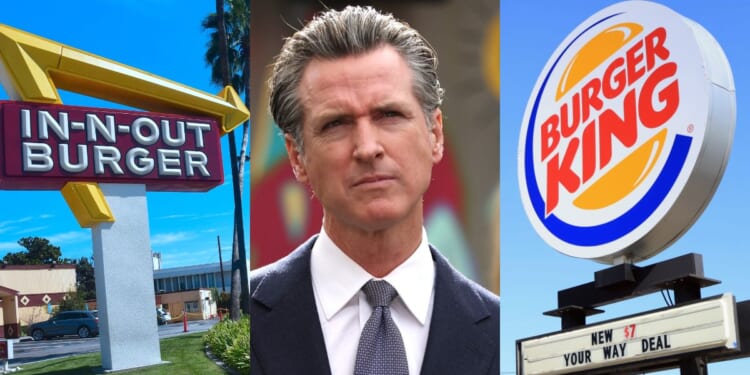Californians are getting a lesson in economics courtesy of the state’s new minimum wage law.
A new law, taking effect this past Monday, created a minimum wage for fast-food workers of $20 an hour.
The New York Post reported that many chains in the state have already increased their prices to deal with the new wage.
Which chains are affected by the new wage?
The Post reported, “The law applies to restaurants offering limited or no table service and which are part of a national chain with at least 60 establishments nationwide.”
The old minimum wage for these restaurants was $16 an hour per state law. With an increase of $4, the Post found several chains have increased menu items to offset that.
The Texas Double Whopper meal at Burger King went from $15.09 on March 29 to $16.89 by April 1. The Big Fish Meal went up from $7.49 to $11.49, with other items on the menu going up by 25 cents to $1.
In-N-Out Burger saw burgers go up 25 cents and soft drinks by a nickel. Hart House, owned by actor and comedian Kevin Hart, increased all milkshake prices regardless of size by a dollar, sandwiches by 50 cents, and large fries by $1.10 going from $4.49 to $5.99.
Is a high minimum wage bad?
While Chik-fil-A, McDonald’s, and Wendy’s haven’t seen price increases, one would have to imagine they are on the way.
California Democrat Gov. Gavin Newsom, explained at a news conference, “This is a big deal. … Eighty percent of the workforce are people of color, two-thirds are women, the majority are breadwinners. And we have the opportunity to reward that contribution. Reward that sacrifice”.
This is not a reward. While it certainly looks great on paper to be paid more for the job, these chains charging more for menu items is just the beginning.
Why would Burger King or In-And-Out keep their chains staffed with the same number of workers? An hour of work previously cost $32 for two employees. Now it costs $40. What’s keeping them from reducing the size of their workforce to further offset the new wage hikes?
Workers will find themselves laid off. Those who keep their jobs will be doing their job and taking on more work during a shift that used to be done by the person who was just fired.
The consumer will also be hurt as previously noted with price increases.
Economics does not happen in a vacuum. One action will have a rippling effect that will impact the entire economy.
Wages go up, prices go up, the workforce goes down and so on.
Gov. Newsom fails to understand this, and Californians will have to learn this lesson.













